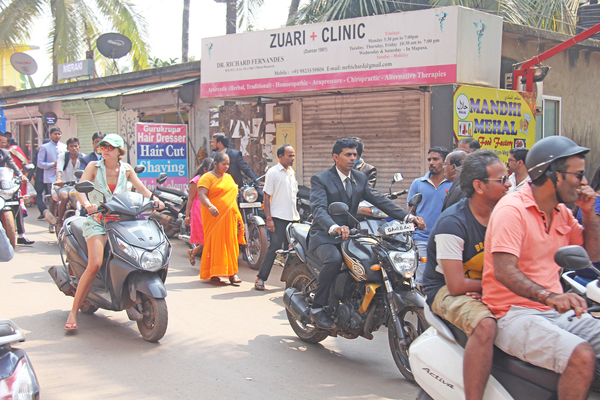Insider's Guide to the Health System in India
Summary: Gain insight into the health care system in India. Explore its accessibility and limitations for expatriates, remote workers, retirees, and others who choose to live in India.

India's healthcare system is a mix of public and private healthcare providers, with the public system providing basic care and the private system providing more advanced care. The public healthcare system in India is called the National Health System (NHS) and is funded by the government. Foreigners (expats and digital nomads) are allowed to use the public healthcare system in India, however, it is not typically used by foreigners due to the quality of care. People generally do not recommend using public hospitals for serious medical emergencies and major surgery, as the quality of care is not as good as private hospitals. Public hospitals in India are often overcrowded and lack the necessary resources to provide quality care.
India's Private Healthcare System
India's private healthcare system is more advanced than the public system and provides a higher quality of care. Private hospitals in India are well-equipped and have the necessary resources to provide quality care. Private healthcare is more expensive than public healthcare, however, expats primarily use private hospitals due to the quality of care. People generally recommend using private hospitals for serious medical emergencies and major surgery, as the quality of care is much better than public hospitals.
India's Top Hospitals
Some of the most well known hospitals in India include:
- Apollo Hospitals (private) - located in Chennai, Delhi, Hyderabad, and other cities
- Fortis Hospitals (private) - located in Delhi, Mumbai, Bangalore, and other cities
- Medanta Hospitals (private) - located in Delhi, Gurgaon, and other cities
- AIIMS (public) - located in Delhi, Bhopal, Bhubaneswar, and other cities
- Christian Medical College (public) - located in Vellore, Tamil Nadu
- Narayana Hrudayalaya (private) - located in Bangalore, Kolkata, and other cities
Health Insurance Companies in India
The most popular private health insurers in India are Star Health Insurance, Apollo Munich Health Insurance, Bajaj Allianz Health Insurance, HDFC Ergo Health Insurance, and Religare Health Insurance. Expats and digital nomads typically use these companies or specialized expat health insurance providers.
Insider Tips from Expats in India: How to Navigate the Health System
"I can't wait to return to the delicious French Indian fusion food and regional Indian specialities that is found in Pondicherry.," commented one expat living in Pondicherry, India.
"Medical services in India are generally of a high standard, with a wide range of specialties available. Many hospitals in India are well-equipped with modern medical technology and offer a range of treatments and procedures. India also has a large number of qualified medical professionals, including doctors, nurses, and other healthcare workers. Additionally, India has a number of medical research centers and universities that are dedicated to advancing medical knowledge and providing quality healthcare," mentioned one expat living in India.
"You can get elective surgery and other non-critical non-emergency medical treatment in India. The medical care is good and affordable to a US citizen. Of course you have to be selective which hospital and whcih doctor you may want to seek help from. Quality varies," commented one expat living in India.
"Healthcare services in India are provided by both public and private sectors. The public healthcare system in India is largely funded by the government and provides basic healthcare services to citizens at a low cost. The quality of public healthcare in India varies from state to state, with some states providing better quality services than others. Foreign residents in India have access to the public healthcare system, but the quality of care may not be as good as in their home countries. Expats in India may use the public healthcare system, but they may also opt for private healthcare services, which are generally of higher quality," mentioned one expat living in India.
About the Author
 Joshua Wood, LPC joined Expat Exchange in 2000 and serves as one of its Co-Presidents. He is also one of the Founders of Digital Nomad Exchange. Prior to Expat Exchange, Joshua worked for NBC Cable (MSNBC and CNBC
Primetime). Joshua has a BA from Syracuse and a Master's in Clinical and Counseling Psychology from Fairleigh Dickinson University. Mr. Wood is also a licensed counselor and psychotherapist.
Joshua Wood, LPC joined Expat Exchange in 2000 and serves as one of its Co-Presidents. He is also one of the Founders of Digital Nomad Exchange. Prior to Expat Exchange, Joshua worked for NBC Cable (MSNBC and CNBC
Primetime). Joshua has a BA from Syracuse and a Master's in Clinical and Counseling Psychology from Fairleigh Dickinson University. Mr. Wood is also a licensed counselor and psychotherapist.
Some of Joshua's articles include Pros and Cons of Living in Portugal, 10 Best Places to Live in Ireland and Pros and Cons of Living in Uruguay. Connect with Joshua on LinkedIn.
Additional Information:
- India Guide
- Healthcare & Health Insurance in India
- Members Talk about Healthcare & Health Insurance in India
- Best Places to Live in India
- Real Estate in India
- Guide to Real Estate in India
- Pros & Cons of Living in India
- Cost of Living in India
- How to Enroll Your Children in School in India
- Educational System in India
- 10 Things to Know Before Moving to India
- Buying a Home in India
- 2025 Guide to Living in India
- Pros and Cons of Living in India 2025
- 2025 Guide to Moving to India




